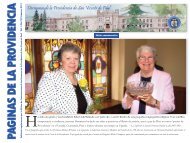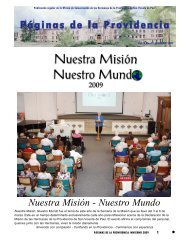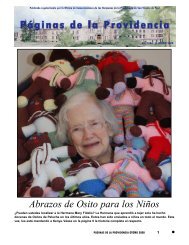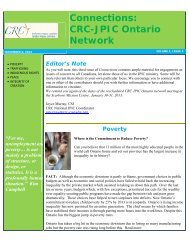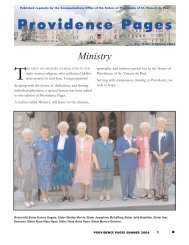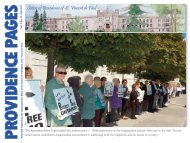PROVIDENCE
pvol3no18 - 150th Commemorative Edition_Layout 1 - Sisters of ...
pvol3no18 - 150th Commemorative Edition_Layout 1 - Sisters of ...
You also want an ePaper? Increase the reach of your titles
YUMPU automatically turns print PDFs into web optimized ePapers that Google loves.
BY CATE HENDERSON<br />
On May 6th and 7th, 2011,<br />
an event of historic<br />
importance occurred in<br />
Ottawa, when 23 participants from<br />
Canada joined together to try to<br />
make this great country of ours seed<br />
and food secure again.<br />
As a representative of the Heirloom<br />
Seed Sanctuary of the Sisters of<br />
Providence of St. Vincent de Paul,<br />
I was one of only two seed sanctuaries<br />
represented the table; the only<br />
two that exist in Canada.<br />
The Sisters’ committed stewardship<br />
of 300 different varieties of seeds is<br />
one of the most important models<br />
Canada has for creating locallyadapted,<br />
ecologically-grown, educational<br />
seed saving facilities across<br />
the country. The participants<br />
emphasized that seed sanctuaries<br />
must be farmer-driven, non-profit,<br />
and publicly-owned. A national<br />
Canadian Seed-Saving initiative is<br />
now afoot.<br />
“This conversation, particularly<br />
about existing seed work and future<br />
possibilities, would be a critical first<br />
step in the building of a pan-<br />
Canadian applied seed action<br />
network and/or program,” said<br />
Kate Green of USC Canada, a nonprofit<br />
international development<br />
organization.<br />
On behalf of the Heirloom Seed<br />
Sanctuary, I offered thanks to USC<br />
Canada and colleagues for organizing<br />
this important event. The Sisters<br />
look forward to helping ensure a<br />
food and seed-secure Canada.<br />
“While locally adapted seeds are<br />
better suited to ever shifting growing<br />
conditions — and thus insurance<br />
for the future — most growers<br />
of organic vegetables and grains in<br />
Canada are forced to purchase seed<br />
from the US, Europe or even farther<br />
afield. Canada simply lacks the<br />
supply. And the supply that exists is<br />
under threat both from industrial<br />
seed contamination and increasingly<br />
unpredictable and extreme weather<br />
Heirloom Seed Sanctuary<br />
Heirloom Seed Sanctuary participates in Canadian Seed Conversation: Building a Seed And Food Security System in Canada<br />
patterns. There is, in short, an<br />
urgent need to build a more sustainable,<br />
biodiversity-based seed supply<br />
in Canada, outside the large-scale<br />
industrial system.”<br />
— Kate Green, USC Canada<br />
Author Cate Henderson, far left, shares a meal with other participants.<br />
It was served in the greenhouse of Ottawa seed grower<br />
Greta Kryger of Greta’s Organic Gardens.<br />
FACTS:<br />
According to Seeds of Diversity Canada:<br />
75% of food biodiversity has become extinct in the past 100 years<br />
60% of the remaining…crop plants are inadequately conserved and<br />
studied.<br />
12th<br />
Saturday, August 27th, 2011 at 10 a.m.<br />
Providence Motherhouse<br />
1200 Princess Street<br />
20



